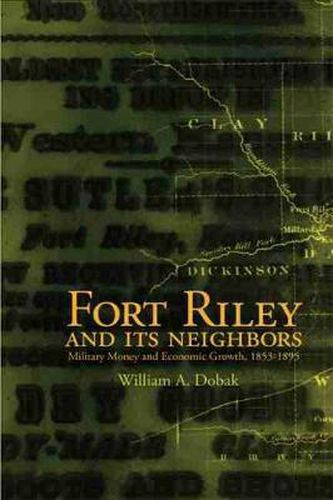Readings Newsletter
Become a Readings Member to make your shopping experience even easier.
Sign in or sign up for free!
You’re not far away from qualifying for FREE standard shipping within Australia
You’ve qualified for FREE standard shipping within Australia
The cart is loading…






Fort Riley and Its Neighbors is a story of soldiers trying to save money and civilians trying to make it.Fort Riley stands today overlooking the Kansas River because army quartermasters in the 1850s thought that small steamboats could deliver supplies cheaply there. Civilians came to help build the fort and stayed to bid on the quartermaster’s contracts for feed and fuel.
Army posts were often a magnet for settlers. Contracts for supplies and transportation brought hard-to-find cash to small western towns, replacing systems of barter and credit and integrating them into the national economy.
Townspeople kept a covetous eye on Fort Riley’s land and its resources, and they voted bond issues to build short-line railroads in order to get competitive freight rates from trans-continental carriers. These short lines put Fort Riley at the center of the nation’s transportation system, assuring the fort’s survival for the next century.
The history of Fort Riley and its neighbors typifies the relations that evolved between the American people and their government throughout the American West. The settlers’ approach to federal authority, at once supplicating and conniving, has persisted and thrived and become the national attitude.
This book won first place in the Dr. Edward Tihen Historical Research and Publication competition, November 5, 1999. This award is presented by the Kansas State Historical Society for Kansas books written by first-time authors.
$9.00 standard shipping within Australia
FREE standard shipping within Australia for orders over $100.00
Express & International shipping calculated at checkout
Fort Riley and Its Neighbors is a story of soldiers trying to save money and civilians trying to make it.Fort Riley stands today overlooking the Kansas River because army quartermasters in the 1850s thought that small steamboats could deliver supplies cheaply there. Civilians came to help build the fort and stayed to bid on the quartermaster’s contracts for feed and fuel.
Army posts were often a magnet for settlers. Contracts for supplies and transportation brought hard-to-find cash to small western towns, replacing systems of barter and credit and integrating them into the national economy.
Townspeople kept a covetous eye on Fort Riley’s land and its resources, and they voted bond issues to build short-line railroads in order to get competitive freight rates from trans-continental carriers. These short lines put Fort Riley at the center of the nation’s transportation system, assuring the fort’s survival for the next century.
The history of Fort Riley and its neighbors typifies the relations that evolved between the American people and their government throughout the American West. The settlers’ approach to federal authority, at once supplicating and conniving, has persisted and thrived and become the national attitude.
This book won first place in the Dr. Edward Tihen Historical Research and Publication competition, November 5, 1999. This award is presented by the Kansas State Historical Society for Kansas books written by first-time authors.